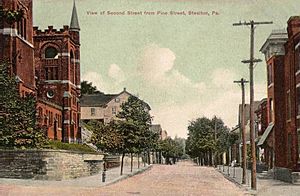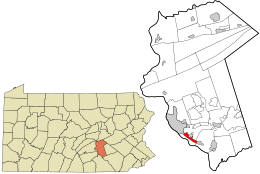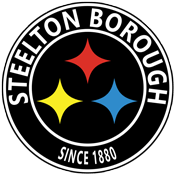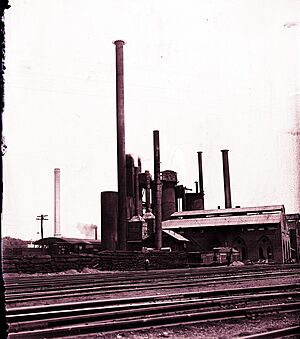Steelton, Pennsylvania facts for kids
Quick facts for kids
Steelton, Pennsylvania
|
||
|---|---|---|
|
Borough
|
||

Second Street in 1910
|
||
|
||
| Motto(s):
"Our Renaissance Continues..."
|
||

Location in Dauphin County and the U.S. state of Pennsylvania.
|
||
| Country | United States | |
| State | Pennsylvania | |
| County | Dauphin | |
| Settled | 1866 | |
| Incorporated | 1880 | |
| Government | ||
| • Type | Borough Council | |
| Area | ||
| • Total | 1.90 sq mi (4.91 km2) | |
| • Land | 1.90 sq mi (4.91 km2) | |
| • Water | 0.00 sq mi (0.00 km2) | |
| Elevation | 315 ft (96 m) | |
| Population
(2020)
|
||
| • Total | 6,263 | |
| • Estimate
(2021)
|
6,245 | |
| • Density | 3,144.51/sq mi (1,214.39/km2) | |
| Time zone | UTC-5 (Eastern (EST)) | |
| • Summer (DST) | UTC-4 (EDT) | |
| ZIP code |
17113
|
|
| Area code(s) | 717 | |
| FIPS code | 42-73888 | |
Steelton is a small town, called a borough, in Dauphin County, Pennsylvania, USA. It is about 4 miles (6.4 km) southeast of Harrisburg, the state capital. In 2020, about 6,263 people lived there. Steelton is part of the larger Harrisburg metropolitan area.
Contents
History of Steelton
The area where Steelton now stands was first home to the Susquehannock Indians. Later, in the 1800s, the Kelker family from Harrisburg owned the land.
Building the Steel Mill
In 1866, Samuel Morse Felton Sr., who was the president of the Pennsylvania Steel Company, chose this 100-acre spot. He wanted to build a steel mill here. This location was perfect because it was close to the Pennsylvania Railroad, the Pennsylvania Canal, and an iron mine in Cornwall.
The land was bought from Henry A. and Rudolph F. Kelker. Alexander Lyman Holley, a pioneer in steel, was chosen to build the mill. It was built along the Susquehanna River and finished by 1867. The mill started working on May 15, 1868.
How Steelton Got Its Name
The town was first called "Baldwin" after Matthias W. Baldwin, who started the Baldwin Locomotive Works. But by 1871, its name changed to "Steel Works." This was because there was another town called Baldwin, Pennsylvania with a post office.
Finally, in 1879, the name became "Steelton." This helped avoid confusion between the post office and the steel mill itself. Steelton officially became a borough on January 19, 1880.
Steel Industry in Steelton
The large steel works of the Pennsylvania Steel Company were later run by Bethlehem Steel and ArcelorMittal. Today, they are operated by Cleveland-Cliffs. In the past, Steelton also had places that made bricks, a flour mill, and machine shops.
Train Accident in 1962
On July 28, 1962, a special train carrying baseball fans from Harrisburg to Philadelphia had an accident in Steelton. The train went off its tracks. Sadly, 19 people died and 199 were hurt. Three of the train's cars ended up in the Susquehanna River. A U.S. Navy drill team that was passing by helped with the rescue efforts.
Steelton's Location and Landscape
Steelton is located in the southern part of Dauphin County. It sits on the northeast bank of the Susquehanna River. To the southeast, it borders the borough of Highspire. To the northeast are the small communities of Enhaut and Bressler.
The state capital, Harrisburg, is very close to Steelton. Its city limits are only about 0.3 miles (0.48 km) away. Downtown Harrisburg is about 4 miles (6.4 km) northwest of Steelton's center.
According to the United States Census Bureau, Steelton covers a total area of 1.9 square miles (4.9 square kilometers). All of this area is land.
Pennsylvania Route 230 (Front Street) is the main road that goes through Steelton. It connects Harrisburg to the northwest with Highspire and Middletown to the southeast.
People of Steelton
| Historical population | |||
|---|---|---|---|
| Census | Pop. | %± | |
| 1880 | 2,447 | — | |
| 1890 | 9,250 | 278.0% | |
| 1900 | 12,086 | 30.7% | |
| 1910 | 14,246 | 17.9% | |
| 1920 | 13,428 | −5.7% | |
| 1930 | 13,291 | −1.0% | |
| 1940 | 13,115 | −1.3% | |
| 1950 | 12,574 | −4.1% | |
| 1960 | 11,266 | −10.4% | |
| 1970 | 8,556 | −24.1% | |
| 1980 | 6,484 | −24.2% | |
| 1990 | 5,152 | −20.5% | |
| 2000 | 5,858 | 13.7% | |
| 2010 | 5,990 | 2.3% | |
| 2020 | 6,263 | 4.6% | |
| 2021 (est.) | 6,245 | 4.3% | |
| Sources: | |||
In 2020, the population of Steelton was 6,263 people. There were 2,109 households in the borough. The average income for a household was $47,556. About 16.1% of the people lived in poverty.
The people in Steelton come from many different backgrounds. In 2020, about 44.0% of residents were White. About 45.5% were Black or African American. About 0.2% were Asian, and 8.3% were from two or more races. People of Hispanic or Latino background made up 17% of the population.
Culture and Fun in Steelton
Front Street has always been a busy and important part of Steelton. It's where you can find shops, banks, churches, restaurants, and places to eat.
Steelton Skatepark
In September 2017, Steelton opened the first skatepark in Dauphin County. It was made even bigger in 2020 and is now 28,000 square feet. This skatepark hosts competitions and is a very popular spot for people in the area.
Historic High School Building
The Steelton High School building is an important landmark. It was added to the National Register of Historic Places in 2011. This means it's recognized for its historical importance.
Education in Steelton
Students in Steelton attend schools in the Steelton-Highspire School District. This district has two schools:
- Steelton-Highspire Elementary School
- Steelton-Highspire Junior/Senior High School
Famous People From Steelton
Many notable people have come from Steelton, including:
- Bull Behman, a former NFL player and coach
- Marylouise Burke, an actress
- Troy Drayton, a former NFL and Penn State football player
- Orrin C. Evans, a pioneering African-American journalist and comic book publisher
- Jordan Hill, a defensive tackle who played for Penn State and was drafted by the Seattle Seahawks
- Homer Litzenberg, a lieutenant general
- Walter M. Mumma, a congressman
- John Yovicsin, a football player and coach
See also
 In Spanish: Steelton para niños
In Spanish: Steelton para niños
 | Delilah Pierce |
 | Gordon Parks |
 | Augusta Savage |
 | Charles Ethan Porter |





